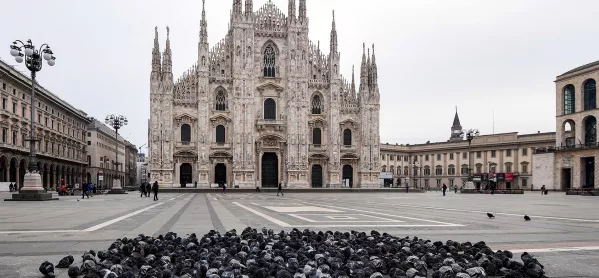- Home
- Leading a school inside the Milan ‘red zone’
Leading a school inside the Milan ‘red zone’

When fear of a possible lockdown hit the UK, there was a run on toilet paper. In Italy, it was pasta that disappeared from the shelves. It’s interesting what this says about different cultural responses. Andrex would not be an improbable name for a virus, especially if you attached a number to it.
Here in Milan, life at present seems bizarre. On Sunday, I went for a walk in the local park. The sun was shining. There were picnics on the grass, people holding hands, eating ice cream. Yes, there were people wearing face masks but I didn’t detect any terror. The supermarkets were well stocked, if rather empty of people.
Live blog: Coronavirus and schools
Coronavirus school closures: What you need to know
Guidance: Coronavirus advice for schools
I arrived here in 2015. One of the first things I noticed was a strange pattern in student absences. The most commonly tendered excuse was ”cervicale”. You won’t find it in any conventional medical textbook. It’s a peculiarly Italian ailment; roughly translated it means “a chill on the neck”. To combat this affliction, which can assail you at any time, natives routinely wear a scarf. Only when the temperature hits 30°C does the fetching yet prophylactic scarf disappear.
Given this extreme sensitivity to cold (wet hair after swimming is another no-no), and given the medical predilection to test for everything, it might be tempting to see the reaction of the government in quarantining 60 million people as extreme.
There is no doubting the economic impact of the decision. Shops are doing no business. The owner of the local café is desolate. And yet the café is the locus of a wonderful absurdity. Picture this: citizens in face masks enter, then sit or stand in a space more densely packed with humans than outside. Mouth masks are removed. Coffee is ordered, and with a slow ritual relish, consumed. Gestures of despair accompany talk of the current situation. Back outside, mouth masks are reset sternly in place.
People I speak to have differing views. Some cite the death of 11,000 people annually from the flu, and ask, is this really much different? Why not reclassify Covid-19 as a particularly virulent flu, insist that anyone over 70 (the vast majority of fatalities) not venture out, and allow vaccinations for children against really serious diseases (all currently postponed) to resume. Sure, people will catch the virus, but so what? You feel rotten for a couple of days, but unless you have an underlying medical condition, you will soon recover, no?
Others maintain that the coronavirus is substantively different. More transmissible. More lethal. The only responsible thing to do is lockdown, isolate, quarantine, before the epidemic - nay, pandemic - gets a hold. The unignorable point in all this is that the medical services are overwhelmed. Not enough beds. Not enough doctors. Retired medics are being pressed into service. To allow the virus to run its course, the argument advances, would mean the collapse of the health system and a spiralling of deaths.
I find myself veering between these different viewpoints as I wrestle with the fact that our school will be closed for a minimum of five weeks. Staff have responded heroically, training quickly in online learning platforms, establishing digital protocols, delivering daily lessons from their homes. I’m incredibly proud of them. Their efforts to minimise disruption to the children’s education have been magnificent. I couldn’t ask for more.
We’ve worked round the clock to produce clear and consistent learning plans, ensuring the students continue to make progress, using all our technological resources, including live interactive lessons, pre-recorded videos, age-appropriate tasks on Padlet, links to resources. We’ve consulted parents, the student council and governors, researched best practice and sought advice. We’re doing our best to offer meaningful and varied tasks, supporting and giving feedback, promoting good study habits, and hoping that the students find the tasks challenging as well as creative and fun.
It’s a fast-moving picture. What worked last week or this might not prove so successful or engaging next week. And we’re trying in the end to reconcile two things: the need educationally to do what we think is the right thing and the need felt by many parents for a childcare solution - and if that means sticking the kids in front of a screen all day, then so be it. Parents are being forced to work with their children at home (who ask constant questions), and not finding it easy. Many of our staff are in the same bind.
The situation is unprecedented. It’s a test of our resilience and our resourcefulness. We aim to pass that test. We don’t panic. Instead, we adapt. We are a strong community, and we need to stay positive. That means drinking coffee, tightening scarves, and - like the incomparable Marcello Mastroianni - offering up a shrug to the world. For what else can we do?
Dr Chris Greenhalgh is principal and CEO of the British School of Milan
Keep reading for just £1 per month
You've reached your limit of free articles this month. Subscribe for £1 per month for three months and get:
- Unlimited access to all Tes magazine content
- Exclusive subscriber-only stories
- Award-winning email newsletters

